Traveling can be an exciting and eye-opening experience, but it’s essential to prioritize safety and security while abroad. Whether you’re embarking on a solo adventure or traveling with loved ones, taking precautions will ensure a worry-free trip. Follow these travel safety tips to safeguard your journey and enjoy peace of mind.
Key Takeaways: Travel Safety Tips: Secure Your Journey!
- Research your destination thoroughly before you arrive.
- Blend in and avoid looking like a tourist.
- Secure important documents and have copies as a backup.
- Share your itinerary with trusted contacts and check in regularly.
- Be cautious when using technology and protect your personal information.
Research Your Destination
Before embarking on your journey, it’s essential to conduct thorough research about your destination. By gathering information, you can make well-informed decisions, ensuring a safe and enjoyable trip. Here are some key steps to consider:
1. Read Traveler Reviews
Take advantage of the wealth of knowledge available through traveler reviews. Websites like TripAdvisor, Yelp, and Google Reviews provide valuable insights from individuals who have already visited your desired location. Pay attention to common recommendations and warnings to gain a comprehensive understanding of the destination’s strengths and potential risks.
2. Consult with Locals
For insider tips and authentic experiences, reach out to locals. Engaging with residents through online forums, social media groups, or local travel communities can provide valuable insights into the culture, customs, and hidden gems of your destination. Locals can help you navigate the area and provide recommendations tailored to your interests.
3. Check the State Department’s Website
Stay updated on the latest travel advisories and country-specific information issued by the U.S. State Department. Visit their website to access comprehensive travel guides and alerts for your chosen destination. The State Department provides valuable resources about safety, security, entry requirements, and potential risks, ensuring you stay informed and prepared.
4. Enroll in the Smart Traveler Enrollment Program (STEP)
The Smart Traveler Enrollment Program (STEP) is a free service provided by the U.S. government. By enrolling in STEP, you will receive important notifications and updates about the safety and security situation of your destination. In case of an emergency, the nearest U.S. embassy or consulate can reach out to you and provide assistance. This program adds an extra layer of protection and peace of mind throughout your journey.
By conducting thorough research and utilizing available resources, you can enhance your travel experience and mitigate potential risks. Knowledge is the key to a safe and rewarding adventure!
| Benefits of Researching Your Destination | How It Enhances Your Travel Experience |
|---|---|
| 1. Awareness of local customs and cultural norms | – Respectful interactions with locals – Immersive and meaningful experiences |
| 2. Understanding of potential safety risks | – Proactive safety measures – Avoidance of high-risk areas |
| 3. Access to insider recommendations | – Authentic local cuisine and attractions – Unique and off-the-beaten-path experiences |
| 4. Preparedness for entry requirements | – Smooth immigration and visa processes – Compliance with local laws and regulations |
Stay Inconspicuous
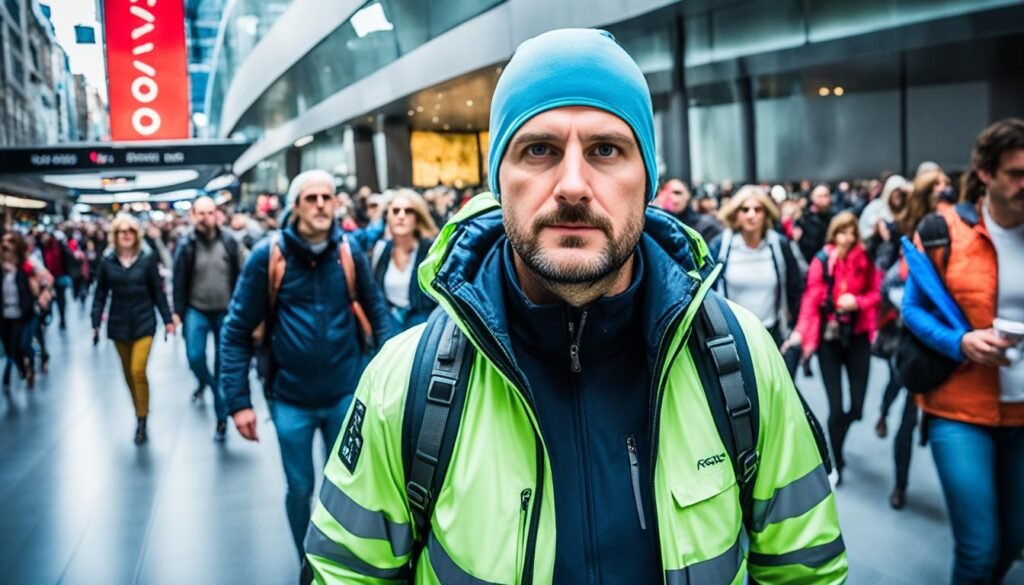
When traveling, it’s essential to blend in with the local culture and not stand out as a tourist. One effective way to achieve this is by choosing inconspicuous clothing that doesn’t attract unnecessary attention. Opt for neutral colors and avoid flashy outfits or accessories that scream “tourist.” By blending in, you can significantly reduce the chances of becoming a target for pickpockets or other petty criminals.
Another important aspect of staying inconspicuous is to be discreet when navigating unfamiliar areas. Instead of conspicuously studying maps or openly asking for directions, try to do so in a discreet and unobtrusive manner. Plan your routes and familiarize yourself with the surroundings before venturing out. This will help you appear more confident and less vulnerable to potential threats.
In addition to blending in and being discreet, consider investing in protective clothing and gear that can provide an added layer of security. For example, hidden pockets or pouches in your clothing can keep your valuables secure and out of sight. RFID-blocking wallets or bags can also protect your credit card information from being skimmed by electronic pickpockets.
Blend In with the Local Culture
One of the simplest ways to stay inconspicuous is to observe and imitate the locals’ style of dress and behavior. Study the way they dress, the types of clothing they wear, and try to adopt a similar style. Pay attention to the social norms and customs, as this can help you blend in seamlessly. Remember, the less you stand out from the crowd, the less likely you will attract unwanted attention.
Quotes:
“When you’re traveling, it’s important to dress and act like a local. Avoid flashy clothing and accessories that make you an easy target for pickpockets.” – Samantha Brown
Protective Clothing and Gear
Investing in protective clothing and gear can provide an added layer of security during your travels. Consider the following options:
- Anti-theft backpack: Choose a backpack with hidden zippers, slash-proof materials, and locking mechanisms to deter pickpockets.
- RFID-blocking wallet: Protect your credit cards and passport from electronic skimming with an RFID-blocking wallet.
- Money belt: Wear a discreet money belt under your clothing to keep your cash and important documents concealed.
Tips for Staying Inconspicuous
| Tips | Description |
|---|---|
| Choose inconspicuous clothing | Opt for neutral colors and avoid flashy outfits or accessories. |
| Be discreet when asking for directions | Avoid openly studying maps or asking for directions in a conspicuous manner. |
| Invest in protective clothing and gear | Consider anti-theft backpacks, RFID-blocking wallets, and money belts for added security. |
By staying inconspicuous and blending in with the local culture, you can minimize the risk of attracting unwanted attention and protect yourself from potential threats. Remember, a discreet and inconspicuous appearance can go a long way in ensuring your safety while traveling.
Secure Important Documents
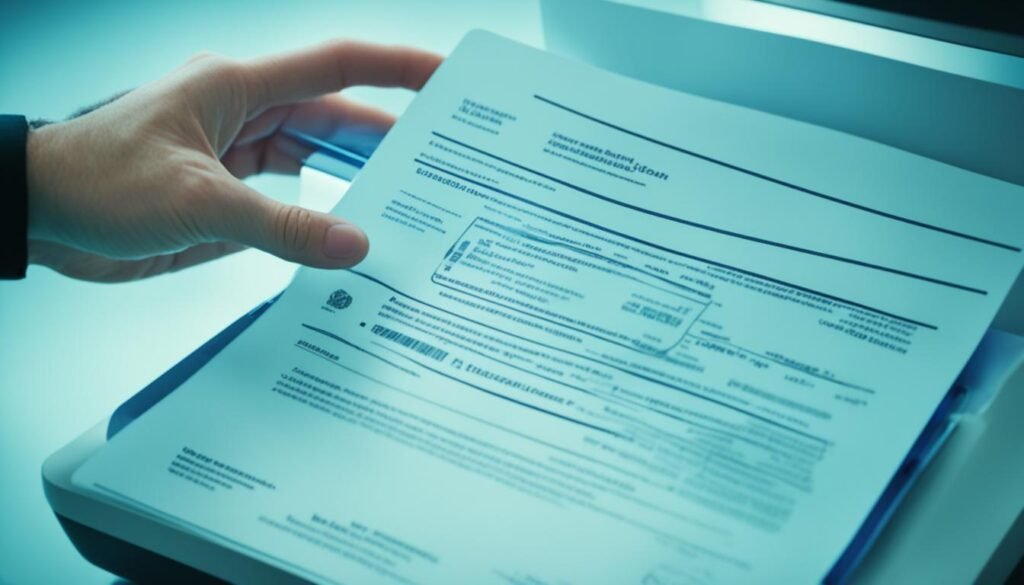
When traveling, it’s crucial to ensure that you have all the necessary documents and proper documentation. One of the essential steps is to make copies of important documents, such as your passport and identification. This ensures that you have backup copies in case your original documents get lost or stolen.
Make hard copies of your passport and identification and keep them in a safe place in your luggage. Additionally, consider scanning these documents and saving them online in a secure location. This provides an extra layer of protection, as you can access your scanned documents from anywhere in case of an emergency.
H3: Proper Documentation
Having proper documentation is vital when traveling, especially if you encounter any issues or need to return home unexpectedly. By carrying copies of your passport and identification, you can prove your identity and citizenship when necessary.
“Having copies of your passport and identification ensures that you have a backup plan and can easily communicate your identity to the authorities or consulate if needed.” – Travel Expert
Remember, having hard copies and scanned copies of your important documents provides peace of mind and provides an alternative source of identification in case of an emergency. Proper documentation is the key to a smooth and secure journey.
Share Your Itinerary
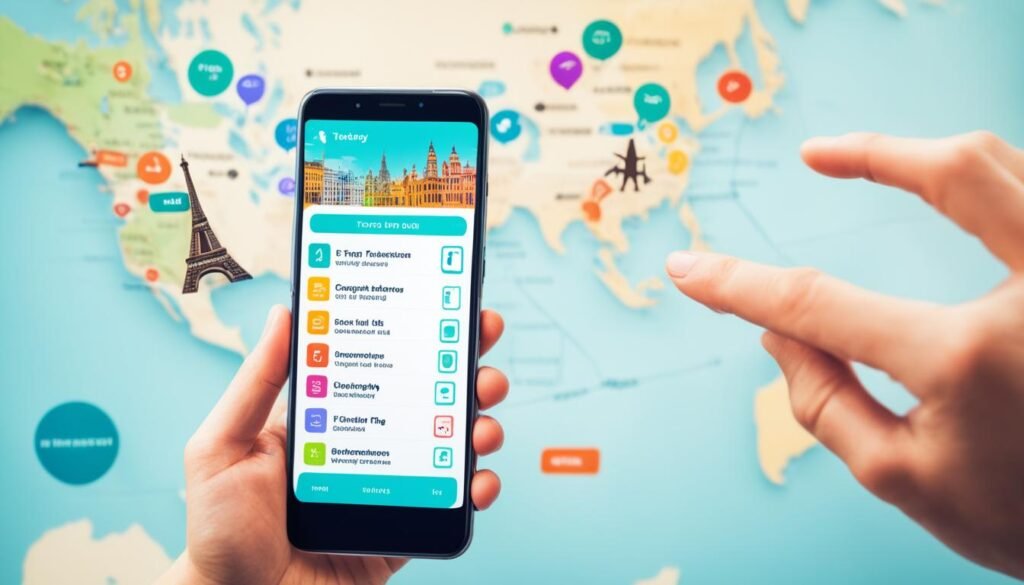
When traveling, it’s always a good idea to share your itinerary with trusted friends or family members. By doing so, you create a safety net of trusted contacts who can keep tabs on your whereabouts and well-being. Sharing your itinerary allows them to have a clear idea of your travel plans, ensuring they know where you are supposed to be at any given time.
When selecting trusted contacts to share your itinerary with, choose individuals who are reliable and responsible. They should be able to handle the responsibility of checking in on you and providing assistance if needed. Consider sharing your itinerary with a few different people, as this increases the chances of timely communication and support.
Regular check-ins with your contacts are crucial during your trip. It not only provides them with peace of mind but also serves as a way for you to keep them updated on your safety and whereabouts. Whether it’s a quick text message or a phone call, the important thing is to establish a consistent line of communication.
Remember, emergencies can happen, and being in touch with your trusted contacts can greatly expedite necessary assistance or support. So, before embarking on your journey, make it a priority to share your itinerary and maintain regular check-ins with your trusted contacts.
Key Takeaways:
- Share your itinerary with trusted friends or family members.
- Select reliable and responsible individuals as your trusted contacts.
- Regularly check in with your contacts to keep them updated on your safety and whereabouts.
- Establish a consistent line of communication with your trusted contacts.
By sharing your itinerary and maintaining regular check-ins, you can enhance your travel safety and provide peace of mind to both yourself and your trusted contacts.
Be Cautious with Technology
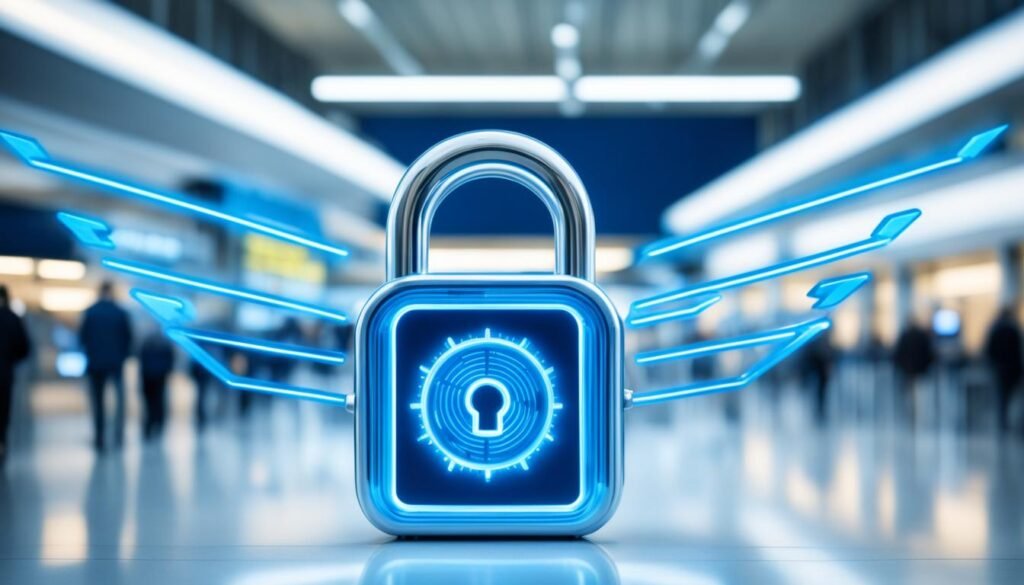
While traveling, it’s essential to be cautious when it comes to technology to protect yourself from potential threats. One of the common risks is using public Wi-Fi networks, which can be vulnerable to hackers who may attempt to access your personal information. To ensure a secure internet connection, consider setting up a virtual private network (VPN).
A virtual private network (VPN) creates a private and encrypted connection between your device and the internet, making it difficult for hackers to intercept your data. By using a VPN, you can browse the web safely, even on public Wi-Fi networks.
Here are some additional steps to protect your personal information while traveling:
- Avoid using public computers or devices for entering sensitive credentials.
- Regularly update your devices and applications to ensure they have the latest security patches.
- Use complex and unique passwords for all your accounts.
- Enable two-factor authentication for added security.
By staying cautious with technology and taking proactive measures to secure your internet connection, you can enjoy a worry-free travel experience.
Benefits of Using a Virtual Private Network (VPN)
A virtual private network (VPN) offers several benefits when it comes to securing your internet connection while traveling:
- Secure Data: A VPN encrypts your internet traffic, preventing hackers from intercepting and deciphering your data.
- Anonymous Browsing: By connecting to a VPN, your online activities remain anonymous, safeguarding your privacy.
- Access Restricted Content: Some websites and online services may be restricted in certain countries. With a VPN, you can bypass these restrictions and access the content you need.
- Prevent Location Tracking: A VPN hides your IP address, making it difficult for websites and online services to track your physical location.
| Public Wi-Fi Risks | VPN Solution |
|---|---|
| Lack of encryption | Encrypts your internet traffic |
| Potential for data interception | Protects your data from interception |
| Increased risk of identity theft | Safeguards your personal information |
| Exposure to malware and malicious activities | Provides an additional layer of security |
“Using a virtual private network (VPN) is an effective way to secure your internet connection while traveling. Don’t risk exposing your personal information on public Wi-Fi networks. Protect your data and browse the web with peace of mind.”
Secure Your Hotel Room
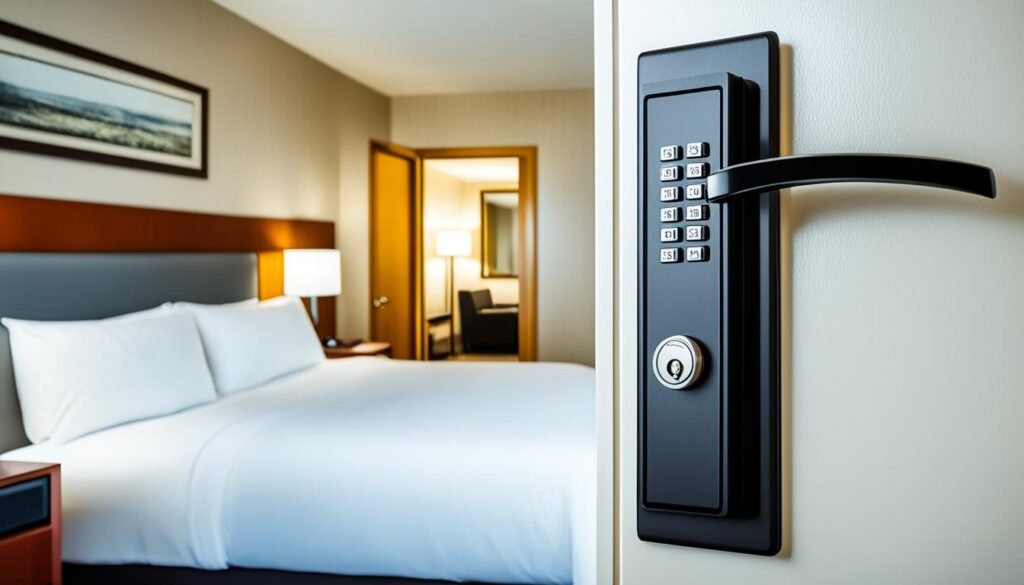
Ensuring the safety of your hotel room is essential for a worry-free stay. Implement these measures to enhance hotel room safety and protect your belongings.
1. Lock Doors: Always lock and dead-bolt the door when you’re inside your hotel room. This simple step provides an additional layer of security and prevents unauthorized entry.
2. Keep Windows Closed: Keep windows closed and locked when you’re in the room and especially when you’re away. Open windows can be an invitation for unwanted intruders.
3. Use Additional Security Devices: Consider using additional security devices like jammers to reinforce the door and provide an extra barrier against unauthorized entry.
4. Utilize the Do Not Disturb Sign: When leaving the room, hang the “Do Not Disturb” sign on the door to create the impression that the room is occupied. This helps deter potential intruders.
5. Keep Blinds or Curtains Closed: Keep blinds or curtains closed when you’re away from the room. This prevents outsiders from seeing inside and potentially targeting your belongings.
6. Avoid Letting Strangers In: Be cautious of letting strangers into your hotel room. Always verify the identity and purpose of anyone who claims to be from the hotel by calling the front desk.
By following these hotel room safety practices, you can have peace of mind throughout your stay and focus on enjoying your trip.
Stay Alert and Trust Your Instincts

When traveling, personal safety should always be a top priority. It’s essential to stay aware of your surroundings and keep a close eye on your personal belongings. By staying alert and trusting your instincts, you can navigate unfamiliar environments with confidence.
Use good judgment when interacting with strangers and meeting new people. While it’s natural to want to be friendly and open-minded, trust your intuition and assess each situation carefully. If someone near you seems suspicious or you feel uncomfortable, it’s important to remove yourself from the situation promptly.
Remember, it’s better to be safe than sorry. Pay attention to any red flags or warning signs that may arise. Trusting your instincts can often prevent potential danger and keep you out of harm’s way.
The Importance of Awareness
Being aware of your surroundings is a crucial aspect of personal safety. By remaining vigilant, you can identify potential risks and take proactive measures to protect yourself. Here are some key tips to enhance your awareness while traveling:
- Stay focused: Avoid distractions such as excessive phone use or being engrossed in a book. Keep your attention on the environment around you.
- Observe the people around you: Be mindful of the behavior and mannerisms of those nearby. Take note of any unusual or suspicious activity.
- Plan your routes: Familiarize yourself with maps and directions before heading out. This will help you navigate confidently and avoid getting lost in unfamiliar surroundings.
- Trust your instincts: If something feels off or doesn’t seem right, trust your gut. It’s better to err on the side of caution.
“Being aware of your surroundings is the first step towards ensuring your personal safety. By paying attention to your environment and trusting your instincts, you can stay one step ahead of potential risks.”
By staying alert, practicing good judgment, and trusting your instincts, you can significantly enhance your personal safety while traveling. Don’t let complacency or distractions compromise your well-being. Remember, it’s important to prioritize your safety above all else.
Tips for Meeting New People
While exploring new destinations, it’s natural to encounter and interact with people from different backgrounds. Here are some tips for safely engaging with new acquaintances:
- Meet in public places: When meeting someone for the first time, choose a well-populated and well-lit location.
- Inform a trusted contact: Let a friend or family member know when and where you’ll be meeting someone new.
- Set boundaries: Establish personal boundaries and communicate them clearly. If someone makes you uncomfortable, politely decline their company.
- Be cautious with personal information: Avoid sharing sensitive details about yourself until you feel comfortable and have established trust.
- Travel in groups: When exploring unfamiliar areas or participating in group activities, there’s safety in numbers.
By following these guidelines, you can maintain personal safety while still enjoying the opportunity to meet new people and create meaningful connections during your travels.
| Personal Safety Tips | Be Aware of Surroundings | Judgment | Meeting New People |
|---|---|---|---|
| Stay alert and vigilant at all times | Be mindful of your environment | Exercise good judgment in your interactions | Take precautions when meeting new people |
| Trust your instincts | Pay attention to red flags and warning signs | Set personal boundaries | Share your plans with a trusted contact |
| Avoid risky situations | Observe the behavior of those around you | Be cautious with personal information | Meet in public places |
| Travel in groups when possible | Familiarize yourself with your surroundings | Be aware of cultural differences | Be mindful of personal safety when meeting online connections in person |
When hitting the road, it’s crucial to be prepared with important travel safety tips everyone should know. Whether you’re traveling solo or with companions, staying safe while exploring the world requires awareness and planning. Always carry a travel lock and stay aware of your surroundings to avoid becoming an easy target for common travel scams. Don’t flash valuables in your back pocket of your pants, and be cautious when using public transportation in foreign countries. Plan to travel with emergency money and copies of important documents, and know your itinerary well. It’s always a good idea to carry a basic first aid kit and stay connected with emergency services and the nearest embassy. Pay attention to what’s happening around you, and let someone know your travel plans, whether it’s a friend or family member. Additionally, familiarize yourself with local customs and water safety, and ensure your water is safe to drink. By following these top travel safety tips, you’ll have peace of mind as you explore the world.
Travel safety tips are essential for every traveler, especially solo travelers, to ensure safe travel experiences. It’s crucial to stay vigilant against scams and scams, carry travel insurance, and safeguard valuable belongings like passports and credit cards. Familiarize yourself with embassy locations and keep important documents secure, perhaps in a money belt worn under clothing. Be cautious in crowded areas where pickpockets may target backpacks and personal belongings. When staying in hostels, secure your belongings and be wary of sharing sensitive information with strangers. Always have a detailed itinerary and stay aware of your surroundings, particularly when using ATMs or navigating unfamiliar areas. By prioritizing personal safety and following these travel safety tips, you can enjoy your journey with greater peace of mind.
When it comes to travel, safety tips everyone should know are crucial for a smooth journey. Whether you’re traveling solo or with companions, staying informed and prepared is key to traveling safely. Always carry a travel lock to secure your belongings and be aware of your surroundings, especially in new places. Pay attention to what’s happening around you and avoid flashing valuables, as this can make you an easy target for pickpockets or scams. It’s important to have a plan in place, including emergency contacts, copies of important documents, and a basic first aid kit. Consider getting travel insurance for added peace of mind and stay connected with emergency services and the nearest embassy. Familiarize yourself with common travel scams and local customs to avoid any safety concerns. Whether you’re exploring the world or traveling alone, knowing your limits and staying cautious can go a long way in ensuring a safe and enjoyable journey. Don’t forget to let someone know your itinerary and stay informed about safety and security measures provided by the Department of State or through programs like the Smart Traveler Enrollment Program. By following these top travel safety tips, you can hit the road confidently and arrive at your destination ready to explore all that it has to offer.
Also Read: 9 Mysterious Islands from Around the World
Conclusion
By implementing these travel safety tips, you can embark on a secure and worry-free journey. Prioritizing thorough research, blending in inconspicuously, securing your important documents, sharing your itinerary with trusted contacts, being cautious with technology, ensuring hotel room safety, and staying alert to your surroundings can provide you with a sense of peace of mind throughout your trip.
Traveling should be a joyful experience, and by following these precautions, you can navigate unfamiliar territories with confidence and without compromising your personal safety. Whether you’re exploring bustling cities or tranquil landscapes, these travel safety tips will help you maintain a secure and enjoyable adventure.
Remember, knowledge is power when it comes to travel safety. Stay informed, be prepared, and trust your instincts. By incorporating these travel safety tips into your plans, you can confidently embark on your journey, knowing that you have taken the necessary steps to ensure a secure and peaceful trip.
FAQs
Q: What are some common travel scams to be aware of?
A: Some common travel scams include pickpocketing, taxi scams, fake police officers, and overcharging at restaurants or shops. It’s important to stay vigilant and aware of your surroundings to avoid falling victim to these scams.
Q: Why is travel insurance important for a safe journey?
A: Travel insurance provides coverage for unexpected events such as trip cancellations, medical emergencies, or lost luggage. Having travel insurance can give you peace of mind and financial protection during your travels.
Q: How can I secure my valuables while traveling?
A: To secure your valuables while traveling, consider using a money belt, keeping important documents and items in a secure location in your accommodation, or using anti-theft bags or lockable luggage.
Q: How can the State Department help me during my travels?
A: The State Department provides travel advisories, embassy locations, and assistance for U.S. citizens abroad. It’s important to register your trip with the State Department and stay informed about any travel alerts for your destination.
Q: Are ATMs safe to use while traveling?
A: ATMs can be safe to use while traveling, but it’s important to be cautious of skimming devices and only use ATMs located in secure areas such as banks or hotels. Avoid using ATMs in isolated or poorly lit areas.
Q: How can I stay safe with water-related activities during my travels?
A: To stay safe with water activities, always swim in designated areas with lifeguards, follow water safety guidelines, and avoid swimming alone or in unfamiliar waters. Be aware of rip currents and local hazards.
Q: What should I include in a first aid kit for travel?
A: A travel first aid kit should include essentials such as bandages, antiseptic wipes, pain relievers, sunscreen, insect repellent, and any necessary prescription medications. Customize your kit based on your destination and activities.
Q: How can I protect myself from common travel scams?
A: To protect yourself from common travel scams, be cautious of strangers offering unsolicited help, never share personal information or financial details with strangers, and research common scams in your destination. Trust your instincts and be aware of your surroundings.




